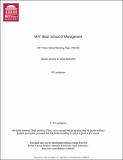| dc.contributor.author | Lamberson, PJ | |
| dc.date.accessioned | 2011-10-24T21:08:16Z | |
| dc.date.available | 2011-10-24T21:08:16Z | |
| dc.date.issued | 2009-10 | |
| dc.identifier.uri | http://hdl.handle.net/1721.1/66569 | |
| dc.description.abstract | This paper analyzes a model of social learning in a social network. Agents decide whether or not to adopt a new technology with unknown payoffs based on their prior beliefs and the experiences of their neighbors in the network. Using a mean-field approximation, I prove that the diffusion process always has at least one stable equilibrium, and I examine the dependence of the set of equilibria on the model parameters and the structure of the network. In particular, I show how first and second order stochastic dominance shifts in the degree distribution of the network impact diffusion. I find that the relationship between equilibrium diffusion levels and network structure depends on the distribution of payoffs to adoption and the distribution of agents' prior beliefs regarding those payoffs, and I derive the precise conditions characterizing those relationships. | en_US |
| dc.language.iso | en_US | en_US |
| dc.publisher | Cambridge, MA; Alfred P. Sloan School of Management, Massachusetts Institute of Technology | en_US |
| dc.relation.ispartofseries | MIT Sloan School of Management Working Paper;4763-09 | |
| dc.subject | social networks | en_US |
| dc.subject | diffusion | en_US |
| dc.subject | mean-field analysis | en_US |
| dc.subject | stochastic dominance | en_US |
| dc.title | Social Learning in Social Networks | en_US |
| dc.type | Working Paper | en_US |
